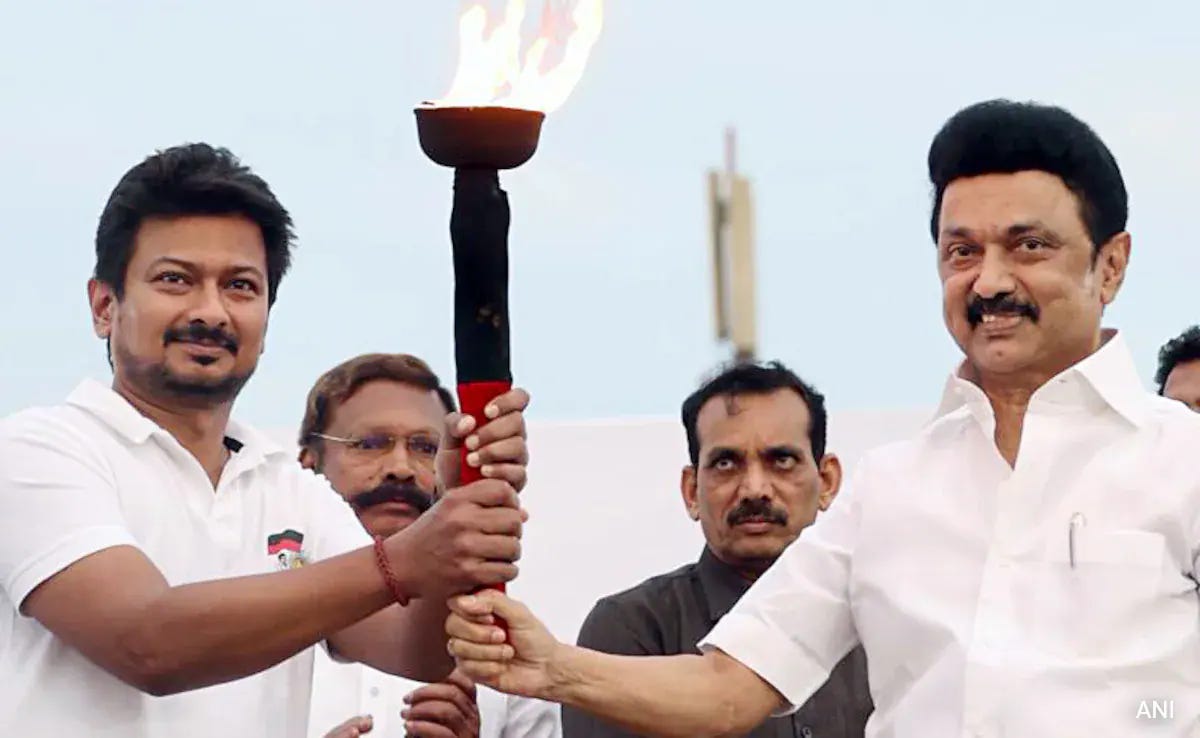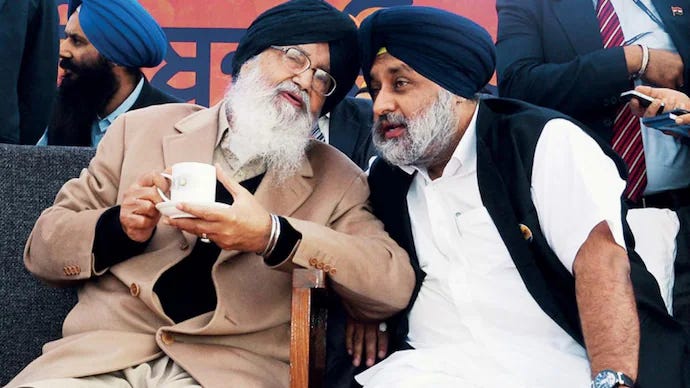And Now, Son Rises in the South
MK Stalin's Son Appointed Deputy Chief Minister of Tamil Nadu: Political Dynasties in India — Power, Progression, or Nepotism?

Political Dynasties in India: Power, Progression, or Nepotism?
India's political landscape has long been shaped by dynastic politics, where power often passes from one generation to the next within political families. This recurring phenomenon raises fundamental questions about democracy, leadership, and meritocracy. The recent elevation of Udhayanidhi Stalin, son of Tamil Nadu Chief Minister M.K. Stalin and already a cabinet minister, as Deputy Chief Minister has once again brought this debate into the spotlight. Is this grooming the next generation of leaders, or is it perpetuating an entrenched system of political privilege?
Tamil Nadu: The Stalin Legacy
The appointment of Udhayanidhi Stalin as the Deputy CM is the latest example of a family legacy continuing its hold on political power in Tamil Nadu. The Dravida Munnetra Kazhagam (DMK) party, led by his father M.K. Stalin, has long been a dominant force in Tamil Nadu’s politics. Udhayanidhi's rise is seen as a natural extension of the Stalin family's political dynasty, but it also brings into focus the questions surrounding political succession in Indian politics—whether it is driven by merit or family connections.
Punjab: The Badals of Akali Dal
In Punjab, the Badal family's political dynasty has faced significant challenges in recent years. Parkash Singh Badal, who passed away in April 2023, served multiple terms as Chief Minister, with his son, Sukhbir Singh Badal, holding the position of Deputy Chief Minister during two tenures. Despite this strong hold on power, the Shiromani Akali Dal (SAD), led by Sukhbir, has seen a sharp decline, winning only 3 seats in the 2022 state elections—a historic low for the party.
Sukhbir Badal, along with his wife Harsimrat Kaur Badal, a four-time Lok Sabha MP, continues to spearhead efforts to revive the Shiromani Akali Dal (SAD), including breaking the party’s long-standing alliance with the BJP over the contentious farm laws in 2020. However, the rise of AAP and the resurgence of the Congress have complicated this comeback. For the Badal dynasty to regain relevance, they must adapt to shifting political dynamics, appeal to younger voters, and modernise their strategy in an increasingly competitive Punjab political landscape—all while facing an open rebellion from the old Akali guard.

Uttar Pradesh: The Yadav Empire
In Uttar Pradesh, Mulayam Singh Yadav, the founder of the Samajwadi Party, passed the reins to his son, Akhilesh Yadav, who became Chief Minister in 2012. Despite internal family conflicts, Akhilesh has remained a key figure in UP politics, showcasing the resilience of the Yadav family in one of India’s largest states. Under his leadership, the Samajwadi Party has maintained a credible performance, even in the face of the BJP’s dominance in the state. In the recent Lok Sabha elections, Akhilesh’s strategic positioning and leadership helped the party secure a significant number of seats as well as share of the vote, proving the Yadav dynasty's continued relevance in Uttar Pradesh's highly competitive political landscape. This enduring influence is a testament to how political families continue to shape regional politics, adapting to shifting voter dynamics and formidable opposition.
West Bengal: The Banerjees
In West Bengal, Mamata Banerjee, the Chief Minister and leader of the Trinamool Congress, unmarried herself, is grooming her nephew, Abhishek Banerjee, for future leadership. Abhishek has already taken on significant responsibilities within the party, signalling a likely political handover in the near future. While the Banerjee family’s influence is relatively recent compared to other dynasties, it remains a pivotal force in West Bengal's political landscape.
Maharashtra: The Thackerays
The Shiv Sena in Maharashtra presents another classic example of dynastic politics. Uddhav Thackeray, who succeeded his father, Bal Thackeray, as leader of the party and later Chief Minister, has brought his son, Aaditya Thackeray, into the political fold. Aaditya's entry into electoral politics has been seen as a strategic move to secure the Thackeray family’s continuing influence in Maharashtra’s governance.
Andhra Pradesh: The Naidu Legacy and the Reddy Challenge
In Andhra Pradesh, N. Chandrababu Naidu’s Telugu Desam Party (TDP) returned to power in 2024, and his son, Nara Lokesh, secured a key ministerial position. Lokesh’s political trajectory has been marked by a recent turnaround, with his 2024 electoral victory after a defeat in 2019, cementing the continuation of the Naidu legacy in Andhra Pradesh politics.
On the other hand, Y.S. Jagan Mohan Reddy, son of the late YS Rajasekhara Reddy (YSR), broke away from the Congress Party after his father’s death to establish the YSR Congress Party (YSRCP). Jagan’s rise to the Chief Ministership in 2019, after building his party from scratch, exemplifies a different path in dynastic politics—one where the son, despite benefiting from a political legacy, forges a new identity independent of his father’s party.
Telangana: The KCR Dynasty Adapts to Opposition
In Telangana, K. Chandrashekar Rao (KCR), the state’s first Chief Minister, has positioned his son, K.T. Rama Rao (KTR), as his successor within the Bharat Rashtra Samithi (BRS, formerly TRS). Following their loss in the 2023 state elections, KTR has taken on the role of opposition leader, ensuring that the Rao family remains relevant in Telangana’s political landscape, even as they navigate the challenges of being in opposition.
Maharashtra: Pawar Family Split and Realignment
In Maharashtra, the Pawar family has witnessed a significant split. Ajit Pawar, nephew of veteran leader Sharad Pawar, joined hands with the BJP to become Deputy Chief Minister, while Sharad Pawar and his daughter Supriya Sule lead a separate faction of the Nationalist Congress Party (NCP). This division within the family highlights the complexities of dynastic politics, where family loyalties and political alliances often clash, reshaping the political dynamics of the state.
Madhya Pradesh: The Scindia Lineage
In Madhya Pradesh, the Scindia family has been influential for generations. Jyotiraditya Scindia, son of the late Madhavrao Scindia, made headlines when he switched from the Congress to the BJP, further cementing his role in national politics. The Scindias exemplify how dynasties evolve with the changing political landscape, adjusting their allegiances to remain relevant.
Rajasthan: The Pilots
In Rajasthan, Sachin Pilot, son of the late Rajesh Pilot, has carved out a significant role for himself within the Congress Party, despite facing internal challenges. Viewed as a future leader, Sachin’s political career reflects the ongoing influence of family legacies, even in states where political competition is fierce.
Haryana: The Hoodas
In Haryana, the Hooda family remains a formidable political force despite recent electoral challenges. Bhupinder Singh Hooda, a two-time Chief Minister, has positioned his son, Deepender Singh Hooda, as his political successor. Deepender, a four-time MP, has become a prominent leader within the Indian National Congress, even after losing his parliamentary seat in 2019. Leveraging his father's strong grassroots network and his own appeal among the youth and Jat community, Deepender continues to wield significant influence.
Though the rise of the BJP and internal Congress issues have posed challenges, the Hoodas remain central to Haryana’s political equation. Bhupinder Singh Hooda’s governance legacy, marked by development and rural outreach, has kept the family’s reputation intact. With the Haryana elections slated for 5th October and counting on 8th October, Hooda Senior is widely expected to lead the Congress party to a facile victory, potentially ending the 10-year BJP rule. However, only time will tell if this anticipated outcome materialises.
The Nehru-Gandhi Legacy: The Archetype of Dynastic Politics
No discussion on political dynasties in India can be complete without mentioning the Nehru-Gandhi family. From Jawaharlal Nehru to Indira Gandhi, and later Rajiv Gandhi, this family has been central to Indian politics for decades. Though Rahul Gandhi and Priyanka Gandhi Vadra remain key figures in the Congress Party, the family’s influence has waned in recent years due to electoral setbacks. However, the Nehru-Gandhi family remains the most iconic representation of dynastic politics in India.
Progression or Nepotism?
The continuation of political legacies through family lines has always been a subject of debate. Supporters argue that political succession within families is natural, akin to children inheriting their parents' professions in other fields like law or business. They claim that growing up in a political environment equips heirs with insights, networks, and experience, making them well-prepared for leadership roles.
Critics, however, contend that dynastic politics stifles meritocracy, limiting opportunities for those outside political families. They argue that such practices consolidate power within elite circles, creating an undemocratic concentration of influence and disconnecting leaders from the broader populace.
The Democratic Mandate: People's Role in Political Succession
While political heirs benefit from their family connections, it’s crucial to note that they still need to win the mandate of the people. In India's democracy, elections remain the ultimate test of leadership. Leaders like Akhilesh Yadav and Uddhav Thackeray had to gain the trust of voters, despite their family backgrounds, to achieve power.
The increasing political awareness among voters means that family names alone are no longer sufficient for electoral success. Leaders are judged on their abilities and performance, with governance and accountability becoming more critical than ever.
Summing Up: The People Are the Ultimate Sovereigns
While political dynasties continue to play a significant role in Indian politics, their success is not guaranteed. The people, through their vote, have the final say in determining who will lead. As India's democracy evolves, it is likely that the balance between traditional political families and merit-based leadership will continue to shift, with the electorate demanding more from their leaders.
In the end, dynasties may influence political power, but it is the people who remain the ultimate sovereigns, shaping the future of India's political landscape.




Grandson.
ਰਾਜਨੀਤੀ ਇੱਕ ਜ਼ਬਰਦਸਤ ਧੰਦਾ ਬਣ ਚੁੱਕਾ ਹੈ। ਇਹ ਰਾਜਾਸ਼ਾਹੀ ਦਾ ਹੀ ਦੂਜਾ ਭਾਗ ਕਿਹਾ ਜਾ ਸਕਦਾ ਹੈ। ਇਹ ਕੋਈ ਸੇਵਾ ਨਹੀਂ ਬਲਕਿ ਧਨ ਦੌਲਤ ਐਸ਼ੋ ਇਸ਼ਰਤ ਪ੍ਰਭਿਤਾ ਅਤੇ ਚਮਕ ਦਮਕ ਹੈ ਜਿਸ ਨੂੰ ਸੱਤਾ ਤੇ ਕਾਬਜ਼ ਲੋਕ ਆਪਣੇ ਪ੍ਰੀਵਾਰਾਂ ਤੱਕ ਸੀਮਤ ਰੱਖਣ ਲਈ ਹਰ ਹੀਲਾ ਵਸੀਲਾ ਵਰਤ ਰਹੇ ਹਨ
ਕੂੜੁ ਰਾਜਾ ਕੂੜੁ ਪਰਜਾ ਕੂੜੁ ਸਭ ਸੰਸਾਰੁ
ਕੂੜ ਕੂੜੈ ਨੇਹੁ ਲਗਾ ਵਿਸਰਿਆ ਕਰਤਾਰੁ